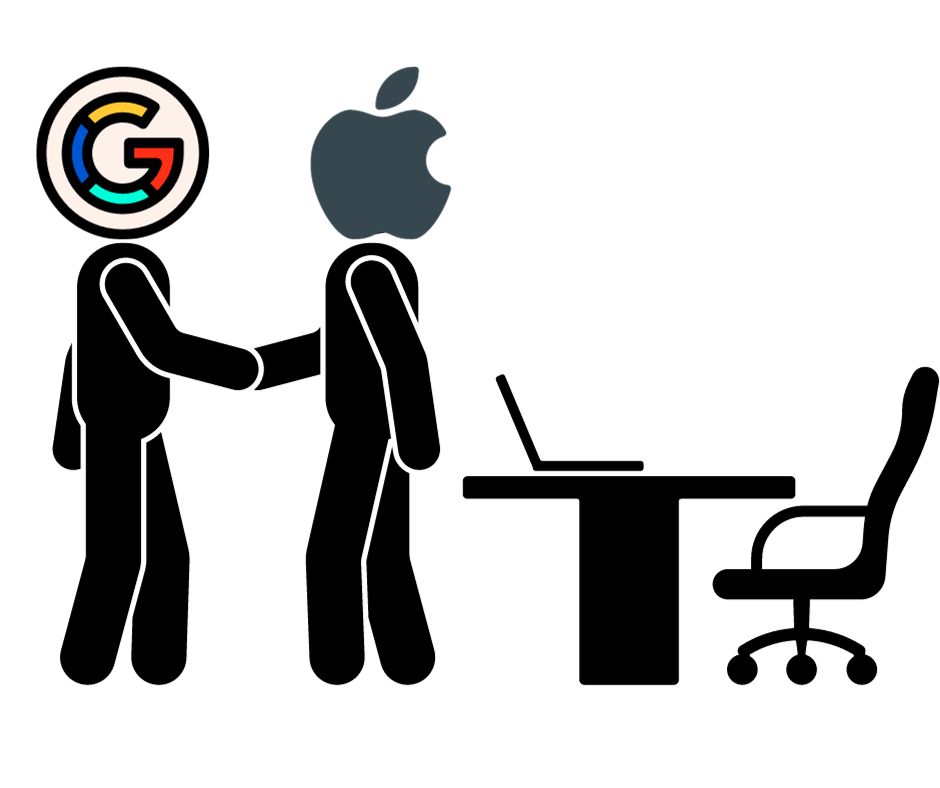Packed with lawyers, judges and officers from all across the nation, the E. Barrett Prettyman U.S. Courthouse in Washington has picked up arguably one of the biggest trials in decades: The Department of Justice vs. Google.
Google, one of the world’s most prominent technology companies, has been charged with allegations claiming they have abused their power as a global monopoly to strike deals with other multi-billion dollar companies to promote their search engine rather than others. Some deals include negotiations with other big name companies such as Apple, Samsung and LG.
Additionally, Google is being tried for self-preferencing, meaning Google tends to put its services and products before others, therefore putting rival businesses at a disadvantage. Some critics also argue that Google’s reign over the search engine market has resulted in them preventing others from challenging its dominance.
Social Studies instructor Joe Youngbauer instructs these subjects in class, discussing blockbusting and linking them to recent occurrences, such as this lawsuit. “There is no doubt that it has a significant impact on me as consumers if we would see anything different, and I also think it’s interesting is Google’s relations with other companies such as Apple where on certain devices you need to use Google, making both companies bigger and bigger,” Youngbauer explained.
Google denies these statements by claiming that it is necessary to have some margins of profit in order to work towards their mission: to organize the world’s information and make it universally accessible and useful. With such a broad vision of making an impact internationally, Google employs over 200,000 workers. To provide salaries for each of these members, Google must receive some profit to ensure that they keep running.
Another concept that Google drives to help with its motive is advancements towards its software and applications. Google is responsible for managing many platforms including Gmail, Drive, Classroom, Docs, Slides, Sheets and more. By owning all these tools, Google must be able to financially support these programs; thus needing billions of dollars in revenue.
Google supports these proofs by insisting that all of their subdivisions are free for the public, meaning they don’t directly receive money from their users, but rather from deals with other companies.
Google’s products have been used in many ways to better the lives of their members. One major breakthrough Google had was the launch of Classroom, which combined aspects of their previous platforms Docs, Slides, and Sheets. This allowed teachers to post assignments and documents that would typically be physical into a digital area.
However, the U.S. Department of Justice argues that with Google’s influence, they can control the industry and do anything they want. Roughly 90% of internet users in the United States and 91% of internet users globally are reported to use Google Search as their primary search engine. With that many users, The U.S. Justice Department believes Google is able to manipulate its users and push forward a monopoly.
Junior Finn McMilian believes some aspects of this trial could fall in the fault of Google while others are a bit of a reach in terms of logic. “I feel like there is enough grounds for an antitrust lawsuit because of their domination of the market share but there are enough competitors to technically not be a monopoly,” McMillian shared.
This trial almost mimics a previous trial against Microsoft. Twenty-two years ago, Microsoft was also pressed with allegations of tying their web browser to the Windows operating system. This makes it practically impossible for rival browsers to compete with Microsoft as they don’t have the access and ability to create a connection with the operating system itself.
The Microsoft trial influenced how antitrust cases against technological companies are approached. From this, the Department of Justice was able to use the precedent set by the Microsoft Trial to formally charge Google on similar counts of protocol violation.
Kenneth Dintzer, the lead prosecutor for the U.S. Department of Justice stated in the trial, “If Google sets the rules, it will always be to their advantage.” Dintzer believes that as Google is the leading contender in the internet field, Google adjusts norms to better fit themselves and to let them grow. Dintzer added, “Google manipulates auctions for ads placed on the internet to raise ad prices,” convinced that Google strives to earn profits rather than help their users.
Google’s legal counsel, John Schmidtlein, responds to Dintzer when called to court. When confronted about Apple and Mozilla, Schmidtlien says, “Google won these competitions on the merits.”
Google has been a widely known search engine since its founding in 1998. As time passed, Google went on to become used by people all over the world and coined the term “Googling” to represent searching something on the internet. Schmidtlein explained how Google has been loyal to its users by not charging a single penny for any of their platforms and gained the trust of its consumers by purely being good at what they do.
Youngbauer believes that Google individually attracts their customers well due to their free services. “As an individual, I don’t pay Google anything, I don’t have some subscription but in my job and in my personal life, I’m relying on it. Whether it’s Gmail, Drive, Classroom, and everything else Google owns,” Youngbauer stated.
With the DOJ vs. Google trial still in its primary stages, the court is yet to see all of the evidence displayed with a clear view of who is likely to prevail. Google, being one of the faces of the tech industry, justices can expect many proofs coming out over the next few weeks or even months. Regardless of the outcome, this trial will shape the future of how tech giants will be able to regulate their respective fields.









